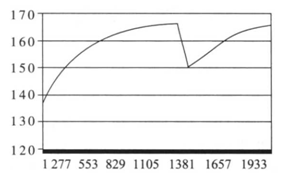题目内容
Technical and technological skills will take on greater importance. There will be a growing need for people who can understand and fix systems―from computer systems to product distribution (分配) systems to plumbing (流通) systems.
Visionary skills (想象能力) will be in demand. The ability to gather and absorb a wide range of input,then use that knowledge,understanding,and view to guide organization into future,will be vital.
Numbers and measurement will be important,of course,but smoothing the flow from month to month,from quarter to quarter will be essential for highly profitable longterm performance. Practically every company will have to move away from today's puzzlement with looking ahead only as far as the next financial reporting period.
Ability to organize will definitely be important in the corporation of the future. Everywhere there will be a need to organize something:resources,workflow,marketing mix,financial opportunities,and much more,all will demand high levels of organization and reorganization.
Persuasive skills will be used in many ways by the corporation of the future,the most effective individuals will be those who know how to present information and ideas so that others can understand and support a particular position. Good salesmanship will be essential in many more interactions than we consider today,especially inside the organization.
Communication skills―careful listening,clear writing,close reading,plain speaking,and accurate description―will be invaluable. In tomorrow's fastpaced business environment there will be precious little time to correct any misunderstandings. Communications breakdown may well become a fatal corporate (企业) disease.
Ability to learn will be above everything else in importance―enabling people to grow in effectiveness and help their companies achieve desired objectives. Some of this skill is innate (天生的) ,but many people improve their ability to learn―and to relate different aspects of learning―through college and university courses. We believe the liberal arts education experience will prove to be the most valuable type of education for tomorrow's leaders.
The top employees of the coming century will be flexible (灵活的) ,creative and motivated toward making a positive difference in the world. They will seek balance,growth and fulfillment in both their work and home environments. The corporation of the future must respond to these needs and desires;otherwise they will find themselves limited by a lack of qualified people to accomplish the organization's work.
( ) 1. From the passage we know that a person who has visionary skills .
A. does a lot of reading and research
B. always takes everything for granted
C. has a better understanding than others
D. has a foresight of what he is devoted to
( ) 2. The top employee in demand is a person who is .
A. used to waiting for the boss's commands
B. a good organizer as well as a good listener
C. talkative but few people can understand him
D. qualified and experienced but refuse to accept new things
( ) 3. The following statements are wrong EXCEPT .
A. most people were born with the ability to learn
B. some misunderstandings won't influence communication
C. people who are masters in their career are top employees
D. if you can make yourself understood then you are an effective person
( ) 4. Which is the main idea discussed in this passage?
A. Various skills are needed in our modern society.
B. Ability to learn is the most important thing.
C. The corporation of the future must respond properly to new desires.
D. Misunderstandings occur chiefly due to lack of communication skills.
1. D有想象能力的人是能用自己的知识和理解来预见未来职场的人。
2. B由第4段和第6段得知。
3. A第7段中说Some of this skill is innate ,表明部分学习的能力是人天生就有的,只是很多人通过后天的受教育来提高这种能力。
4. A文章主要介绍的是当今社会需要的不同技能;其他选择为部分,不可以偏概全。


